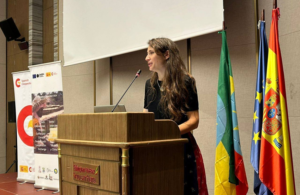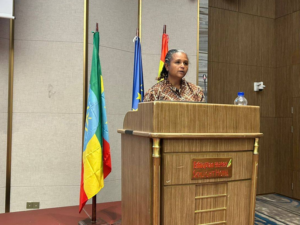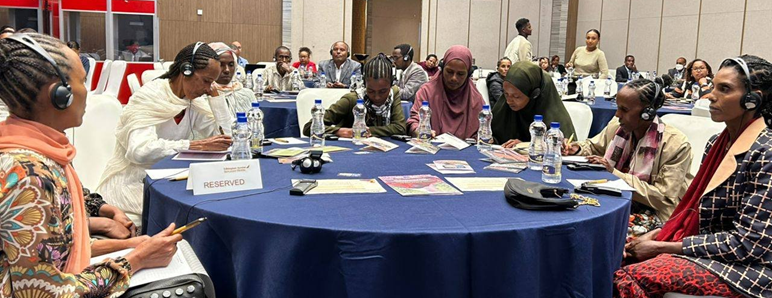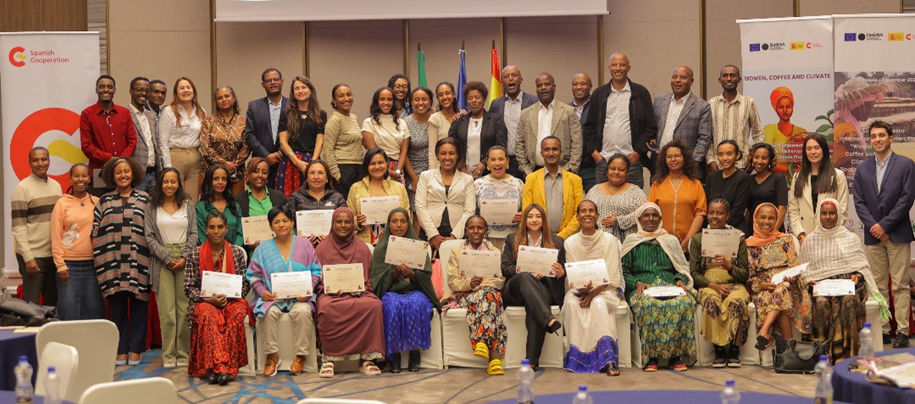Women, Coffee and Climate: Women’s Empowerment for Socio-Ecological Resilience of Coffee Value Chain against Climate Change in Ethiopia
3 December, 2024
VI International Exchange Visit and Closure Event
December 03, 2024 | Addis Ababa, Ethiopia
The VI International South-South Cooperation Exchange Session and Closure Event, held in Addis Ababa and Jimma over a course of a week, marked a significant milestone for the Women, Coffee, and Climate Project. Key coffee institutions from Ethiopia, Colombia, and Honduras came together to review two years of impactful collaboration and also as part of the Ethiolatin Coffee Community of Practice, which has been active since the very first year of the project. The Closing event, hosted in on December 03, 2024, and held in four languages -Amharic, Afan Oromo, English and Spanish- brought together representatives from Ethiopian coffee institutions (ECTA, EFD, EIAR-JARC, WICE, OSSREA), their Colombian counterparts (FNC, TECNICAFE, AMUCC), and Honduran partners (IHCAFE, AMUCAFE), alongside stakeholders from the European Union and Spanish Cooperation.
The event commenced with an opening remark from H.E. the Ambassador of Spain to Ethiopia, Mr. Guillermo López Mac-Lellan, followed by Mr. Mersha Argaw, Program Manager at the European Union Delegation, to Ethiopia and Dr. Adugna Debela, Director General of the Ethiopian Coffee and Tea Authority (ECTA).
During the event, participants celebrated the achievements of the project, which is funded by the European Union’s DeSIRA Program and Spanish Cooperation. Through interdisciplinary research, gender-focused initiatives, and knowledge sharing through the South-South Cooperation approach, the project has promoted gender equality and sustainability within Ethiopia’s coffee value chain. To this end, the event featured presentations of key lessons learned and achievements shared by implementing partners, setting the foundation for continued progress. The presentation highlighted the concerted efforts of partners over the past two years aimed at empowering women, building climate resilience, and making the coffee value chain more sustainable through participatory action research and transforming this scientific and traditional knowledge into action across levels and sectors with several strategies, action plans, policy briefs, manuals, workshops, trainings and events.



Photo 1. Presentations by the Spanish Cooperation Office, the expert Ms Lemlem Abeba, and Tecnicafe.

Photo 2. Participants coming from Jimma area during the Closing Event.
Additionally, the team was able to share some of the knowledge products that were produced throughout the project period. Some of these products include: Women in Coffee Value Chain Policy Brief, ECTA Market Strategy for Ethiopian Women, Guideline for integrating gender equality principles in into landscape management in the coffee sector, Guideline on the Need for a Policy Regarding Coffee by-products and the Circular Economy, Gender and Climate Action in the Coffee Sector, among others.
Ethiolatin Coffee CoP dedicated webpage was shared along with information on the importance of connectivity and ongoing collaboration. The platform holds digital copies of all knowledge products, including but not limited to policy briefs, manuals, action plans, monthly webinar recording/ reports, produced during the project period.
The event also included a panel discussion, whereby women experts and farmers from Ethiopia, Colombia, and Honduras discussed the ‘Women, Coffee, and Climate Nexus,’ underscoring the shared challenges and solutions across coffee-producing nations.

Photo 3. “Women, Coffee and Climate Nexus” panel discussion session.
Moreover, ECTA launched the Call Centre established at their Headquarters to support women and families in rural area to also have access to relevant information regarding coffee across the value chain.
The Closing event has provided delegates with networking Opportunities whereby all attendees participated in a traditional Ethiopian coffee ceremony, fostering cross-sector and cross-country relationships.

Photo 4. Participants during the Closing Event.
The success of the project reaffirms the importance of a gender perspective in a multi-stakeholder collaboration and knowledge-driven policies in creating a sustainable, inclusive coffee sector. The event also spotlighted the innovative Ethiolatin Coffee Learning Community as a model for global cooperation, bridging research, policy, and practice.
The Women, Coffee, and Climate Project has proven that addressing gender and climate challenges requires integrated approaches, uniting governments, private sectors, research institutions, and civil society across the coffee value chain. The legacy of this initiative will continue through strengthened networks, evidence-based policy recommendations, and a shared commitment to sustainability.
***
Source: This article is authored by Spanish Agency for International Development Cooperation (AECID).